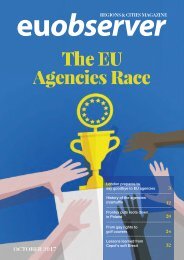Separatism: Making Europe stronger?
The 2014 edition of EUobserver's Regions & Cities magazine looks at separatist movements across Europe and its impact on the union.
The 2014 edition of EUobserver's Regions & Cities magazine looks at separatist movements across Europe and its impact on the union.
Create successful ePaper yourself
Turn your PDF publications into a flip-book with our unique Google optimized e-Paper software.
GLASGOW: Ahead on Roma<br />
inclusion<br />
Glasgow is often held up as an example of how to integrate Roma communities, but social workers<br />
say this has nothing to do with an EU-funded project active there. By: Valentina Pop<br />
Compared to Edinburgh with its<br />
pretty castles and open golf courses,<br />
Glasgow is a whole different story.<br />
Spread out along the river Clyde,<br />
Scotland’s second largest city has a<br />
distinctly working-class feel to it.<br />
In the southern area of Govanhill, you<br />
can shop for fruit in Arab shops, listen<br />
to Roma accordions on the street and<br />
get your car washed in a Pakistanirun<br />
garage. Over 50 languages<br />
are spoken in the roughly 15,000<br />
strong community. Some 4,000 of<br />
its residents are Roma, mostly from<br />
Slovakia and the Czech Republic, but<br />
increasingly also from Romania.<br />
It is a melting pot. But sometimes<br />
it “feels like a doomed place for<br />
vulnerable people, exposing them<br />
to exploitation,” says Katarina<br />
Zborovianova, a social worker who<br />
tells of women sorting potatoes for 12<br />
hours at a time, leaving their hands<br />
numb and swollen.<br />
Zborovianova, a Slovak national who<br />
works for a local charity in Glasgow,<br />
the Crossroads Youth and Community<br />
Association, says that economic<br />
exploitation underpinned the first mass<br />
arrivals of Czech and Slovak Roma in<br />
Govanhill, back in 2005.<br />
“They paid overpriced rents and were<br />
taken to factories by bus for which they<br />
also had to pay. They were charged<br />
even for uniforms. So there was a<br />
vicious circle of dependence, because<br />
they were not earning enough and<br />
had all these debts accumulating,”<br />
Zborovianova says.<br />
ROMANET PROJECT<br />
TWINNING TEN EU CITIES<br />
In the meantime, however, the situation<br />
has improved. Over 40 organisations<br />
work with the local community in<br />
Govanhill to provide counselling,<br />
English courses, and training so that<br />
people can find jobs, send their kids to<br />
school and integrate.<br />
Glasgow is now held up as an<br />
example for how to integrate Roma<br />
communities. It is part of the RomaNet<br />
project, which twins 10 EU cities<br />
also working on integrating <strong>Europe</strong>’s<br />
largest minority.<br />
“There are lots of activities in<br />
Govanhill, different organisations<br />
have different ways of interacting, but<br />
local authorities are now connected<br />
to these grassroots activities through<br />
RomaNet,” says Ann Hyde, the lead<br />
expert for the project.<br />
She admits that it will “take a long<br />
time” to change mentalities and get all<br />
the recommendations implemented by<br />
local authorities.<br />
But she notes that the network helps<br />
because it shows municipalities in<br />
Hungary, Slovakia and the Czech<br />
Republic how inclusive policies work<br />
in Spanish or Scottish cities.<br />
Other social workers, however,<br />
grumble that more money should be<br />
allowed to trickle down to where it is<br />
most needed rather than being spent<br />
on local officials travelling to meetings<br />
to exchange good practices.<br />
“There are a lot of good projects at<br />
local level, charities and organisations<br />
do co-operate. But this has nothing to<br />
do with RomaNet,” says Eva Kourova,<br />
a Roma youth project leader for the<br />
West of Scotland Regional Equality<br />
Council.<br />
Her colleague from Slovakia, Marcela<br />
Adamova, who founded Friends of<br />
Romano Lav (Roma Voice), a charity<br />
fighting discrimination, added that<br />
participation in RomaNet meetings<br />
was restricted to Glasgow council<br />
members, while local officials from<br />
other countries did bring along social<br />
workers.<br />
They both agreed, however, that life<br />
for Roma in Glasgow is better than<br />
in the villages back home, where<br />
local authorities have been known to<br />
build walls and put Roma children in<br />
schools for the mentally disabled.<br />
REGIONS & CITIES 2014 15


















